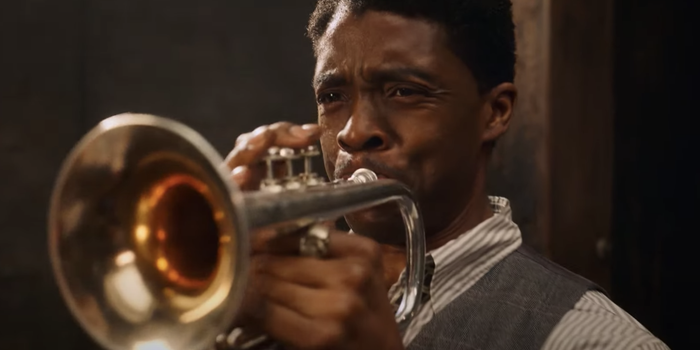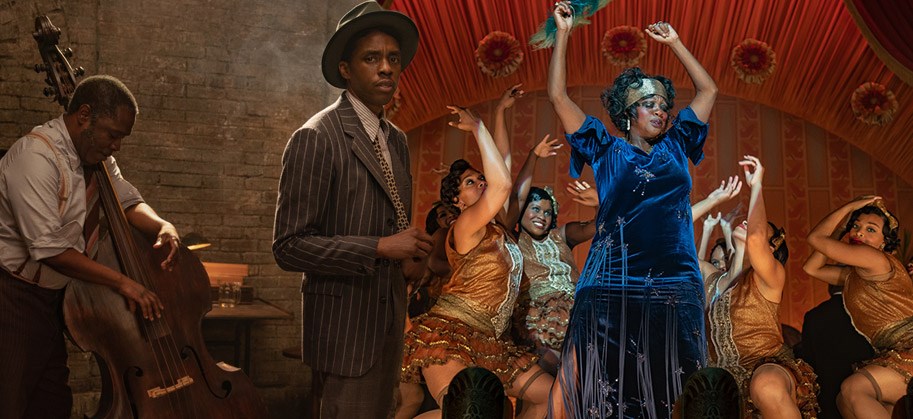Ma Rainey’s Black Bottom is more than a title - it’s a song that’s a knockout blow. And the new adaptation of the famous play that’s now playing on Netflix is one of the best movies of the year.
With the soul of a revolution and explosion of a trumpet horn, two master actors lead a terrific cast to celebrate black art, voices, and the work it takes to make it possible.
Based on August Wilson’s play of the same name from his famous “Pittsburgh Cycle”, the story centres on one day in a 1927 Chicago recording studio. Blues legend Ma Rainey (Viola Davis) is set to record an album of her sold-out tour - but the producers and her hot-headed trumpeter Levee (Chadwick Boseman) are picking fights over how to play the music.
Most people interested in watching (or who already know about the film) are likely here for the two starring players, and both of them bring their A-game in career-topping work.
First is Davis, who won an Oscar in 2016 for Fences, another August Wilson film. Her Ma Rainey is unrecognizable from how she normally appears on screen. The way she moves, moves, speaks and breathes; Davis has never made such a fully formed and transformative person, though credit for her vocals go to singer Maxayn Lewis.
Right beside her, stealing the show both as character and performer behind the mask, is Chadwick Boseman. He’s famous for playing historical figures like Jackie Robinson, James Brown and Thurgood Marshall. Though yes, he’s now best known as T’Challa in Black Panther and the Marvel Cinematic Universe, becoming a hero for a generation.
Boseman tragically passed away of colon cancer back in August this year at the age of 43, making Ma Rainey his final film appearance. If this is how he leaves us, we’re in good hands. His performance as Levee is electric and among the most versatile he’s ever done. He sings, dances, fights, jokes and trumpets (oh, how he trumpets!) like a man on a mission.

While his work is great and a terrific swan song, it’s poignant that he’s playing Levee as a man believing in his own invincible legacy. “Let him strike me,” Levee says, talking of his own power, “I ain’t scared of God.” When he gets his midway monologue on the white man, Boseman makes it impossible to look away from the screen.
The production design and costumes have the aura of a lavish, Broadway staging. The trouble is some of the slickness and shine of moving Broadway-size sets and costumes on screen means you lose some of the authenticity that a movie can find.
Especially in the improvisational nature of 1920s blues music, the actors move with fluidity and it's easy to believe these sessions are real. But the setting around them seems so methodical, technical and perfect that it’s hard to believe these are real people.
But still, that stylized showmanship fades within the first fifteen minutes. If that’s what you keep focusing once the recordings start, then you clearly aren’t listening to the music - both in the prose and in the instruments themselves.
It’s always a good sign when the movie ends and you’re left wanting more time with the characters to see what else might happen in the studio. Director George C. Wolfe has done a great job building the adrenaline in Ma and the band’s music.
The sound will stay with you long after the credits come on screen. Davis and Boseman are incandescent, leading an incredible ensemble in one of the best Broadway adaptations ever made and one of the best pictures of the year.
Ma Rainey’s Black Bottom
9 out of 10
14A, 1hr 34mins. Music Drama.
Directed by George C. Wolfe.
Starring Viola Davis, Chadwick Boseman, Colman Domingo, Glynn Turman, Michael Potts and Jeremy Shamos.
Now streaming on Netflix for subscribers.
A footnote: along with the film's release, Netflix also released a 30-minute behind-the-scenes documentary short about the legacy of blues music and the history that influenced the film. Called Ma Rainey's Bottom: A Legacy Brought to the Screen, it's also well worth a watch.



